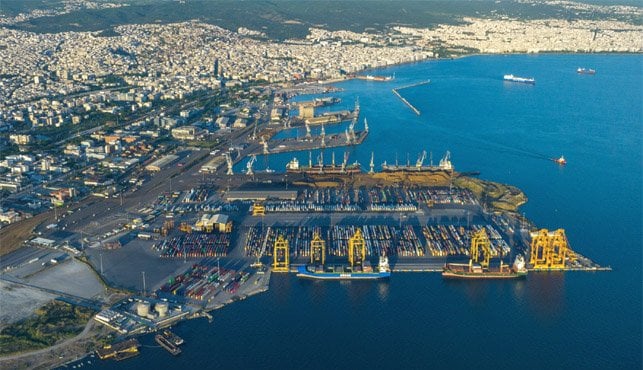Thessaloniki Port Expansion Begins as US Calls for Alternatives to COSCO

An agreement was signed to put into motion the planned expansion of the Port of Thessaloniki in northeastern Greece. While historically a smaller operation, the expansion comes as the United States has been calling for Greece to take steps to lessen the influence of China in Greek ports.
Port officials are calling the new project “the most important upgrade project in the history of the Port of Thessaloniki.” A port since ancient times, Thessaloniki has seen a rapid expansion trend since 2018. It has the potential to become not only a key secondary port of Greece but also a gateway for transshipment into Eastern Europe.
The port company has completed a new concession agreement with the Hellenic Republic, which, among other steps, calls for a drastic strengthening of the port’s infrastructure. Pier 6, which is used for containerships, will be lengthened by an addition of 513 meters (more than 1,600 feet). The yard space for containers will also be expanded.
A significant dredging program is part of the effort to deepen the navigation channel and the maneuvering area. The project is projected to require 40 months, and when completed, Thessaloniki will be able to handle very large container vessels (VLCVs) with a capacity of up to 24,000 TEU. It will be a unique capability for northern Greece. The total budget for the project is €195.6 million ($225 million).
The port’s capacity will be expanded to handle 1.5 million TEU annually. In 2024, the port handled 566,000 TEU, which represented a nine percent increase over the prior year. It also handled approximately 250,000 tonnes of general cargo and has a growing business with cruise ships.
“The expansion of Pier 6, the largest upgrade project in the history of the port, creates the conditions for Thessaloniki to strengthen its role in the Mediterranean as a strategic trade hub for Southeast Europe,” highlighted Dr. Ioannis Tsaras, CEO of ThPA S.A., the port’s operator.
The United States’ new ambassador to Greece, Kimberly Guilfoyle, has been emphasizing during her recent meetings that Greece needs to take steps to decrease China’s influence. Arriving this month in Greece on her first appointment as an ambassador, Guilfoyle called the 16-year-old agreement with COSCO for the operation of the container terminal in Piraeus “unfortunate.” She suggested there would be ways around the company’s controlling ownership stake of the container terminal, including the expansion of alternate ports. She also said, “Perhaps Piraeus could be for sale.”

that matters most
Get the latest maritime news delivered to your inbox daily.
Greece was quick to defend its agreement with the Chinese company and said it respects existing agreements. China’s embassy in Greece lashed out at Guilfoyle and the United States, saying that Guilfoyle’s remarks were interference and “violate the basic professional ethics of a diplomat.”
The Chinese Embassy called the U.S.’s remarks “erroneous” and interference in Greece’s internal affairs. It was emphasized that COSCO was the only bidder for the concession in Piraeus in 2009 at the height of Greece’s financial crisis. The Chinese official highlighted the strong growth of container operations in Piraeus after COSCO’s investment.
